Marcus Sedgwick's Blog, page 8
July 19, 2011
The right hand giveth, the left hand taketh away
Reposting my guest blog from The Periscope PostAccording to CILIP, the professional body of our country's librarians, one in six adults in the UK are functionally illiterate. This means they have literacy below that expected of the average 11 year old. We are not talking here about using reading as a leisure activity, as a source of pleasure, we're talking about reading levels insufficient to be able to live, to work to full potential. To communicate.Thinking long term, the sensible approach is to correct the problem early, by improving the literacy of primary school children. So, good news, at the end of 2011 the government awarded a grant of £110 million to be used to boost the attainment of the poorest children in the country.Launched last week, one of the first announcements of the Education Endowment Foundation, who will administer this fund, is a piece of research that shows that, unsurprisingly, it's our poorest children who are most likely to suffer such disadvantages: A staggering three out of five (60 percent) of children from the poorest sections of society lack basic literacy. Looking in more detail, the 165,000 pupils that the EEF will target are half as likely as their better-off peers to reach national standards at primary level (40 percent v. 81 percent), and one third as likely to reach national standards at secondary level (18 percent v. 61 percent). And, far from improving, the picture is getting worse. Three years ago, 45 percent of primary school children met these standards; the figure now stands at 40 percent. So it would seem like there's no better time to be throwing some cash at the problem.However, CILIP, many teachers, publishing professionals and various children's authors argue convincingly that at the core of any child's progress towards literacy should come a good relationship to books, at best, a love of reading. And where is any child from one of the poorest households described above going to find books? Free books, thousands of them? In their public or school library, that is where.On the same day as the launch of the EEF, the government released its white paper on Open Public Services. Rather lost amidst the spectacle of the revelations concerning New International, the white paper, while according to many pundits a watered down version of Cameron's initial plans, contains nevertheless the imperative for the control of public services, including libraries, to be outsourced to private companies, charities, community groups, you name it. And explicit in this process is the belief that struggling services should be allowed to fail: "The inevitability of small levels of failure is not an excuse for dismantling the system of open public services and returning to the old ways of top-down prescription.Speak to any librarian and they will be more than happy to regale you with accounts of the reduction in funding and services to libraries not just since the coalition came to power, but over the past several years. How galling is it therefore, to find yourself in a service that can now be deemed as failing when funding has been repeatedly cut? For libraries, cuts means reduction in opening hours, reduction in book budget, and reduction in qualified staffing. According to the Voices for the Library campaign, it seems that over 10 percent of UK libraries are currently under threat, on top of those that have already seen closure.Around the same time that the announcement of the EEF was made, we also learned that the Museums, Libraries and Archives (MLA) Council was to be abolished, and responsibility for library services to be handed to the Arts Council instead. And with a 25 percent reduction in their budget. As for libraries, the Arts Council announced last week that it intends to "speak up for libraries" in the Review of the Arts Council's Strategic Framework. What the review doesn't mention is that it will be doing this with an allocation for libraries slashed from £13 million to just £3 million.Well, we have to save money somewhere, right? Just a shame it has to come at the cost of our children's literacy. Does £3 million sound like a lot to you? In governmental terms, it sounds pretty tiny, especially if you compare it with something like Defence spending, the 2010 figure for which was over £43 billion. Then it sounds very tiny indeed.
Published on July 19, 2011 01:27
July 5, 2011
Radio silence
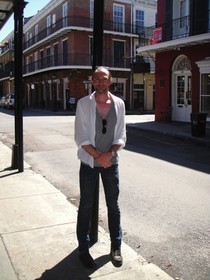
Like many bloggers I am guilty of occasional long silences, a result of having too much to do and yet not much to say about it either.
I've been travelling a lot, doing talks and school events, and got back last week from the States, where I'd been in New Orleans at the ALA conference, which was excellent: I discovered that American school and public librarians are every bit as wonderful, enthusiastic and knowledgable as their British counterparts. Why, on both sides of the Atlantic, we are cutting library services, is beyond me. Or rather, I know full well why, but it's a crime.
I also had time to indulge my obsession with Bond: this is the location of the Jazz funeral at the start of Live and Let Die :-)
Today is my last school event of the season, and then I have two weeks to write half a book, and co write half a screenplay with my brother. Oh, and get ideas for a new YA book together, finally. So that should all be a doddle, and I'm wondering what to do with my spare time :-/
Published on July 05, 2011 02:21
April 2, 2011
Twitter event for Edbookfest
I've just written a short story called 'Archipelago' for Edinburgh Book Festival for a project called 'Elsewhere'. They invited me to do a twitter q and a session today, and there's a transcript of the whole event online here:
http://edbookfest.blogspot.com/2011/0...
It was great fun, some deep questions, some silly ones, some that really stumped me, but the most interesting thing is that I find these events more nerve-wracking than 'real' ones, for some odd reason. Part of it is that you don't know who, or how many people, you're talking to, unlike a real event.
But it was fun and it's good to think you can communicate with people around the world all at once.
http://edbookfest.blogspot.com/2011/0...
It was great fun, some deep questions, some silly ones, some that really stumped me, but the most interesting thing is that I find these events more nerve-wracking than 'real' ones, for some odd reason. Part of it is that you don't know who, or how many people, you're talking to, unlike a real event.
But it was fun and it's good to think you can communicate with people around the world all at once.
Published on April 02, 2011 07:24
February 28, 2011
Cover design
 I've got time for one more pass through my new book, Midwinterblood, to be published this autumn, and that means it's time for the design team at Orion to kick into overdrive with the cover. I like this bit for lots of reasons, not least because my work is nearly done and I can 'advise' on someone else trying to get the best out of the thing.
I've got time for one more pass through my new book, Midwinterblood, to be published this autumn, and that means it's time for the design team at Orion to kick into overdrive with the cover. I like this bit for lots of reasons, not least because my work is nearly done and I can 'advise' on someone else trying to get the best out of the thing.Midwinterblood was always going to be a challengin cover design, because the book has so many different elements. Which to go for? What to focus on? In the end, as I've probably said on numerous occasions, it comes down to one thing. It took me years to realise what a cover should do, and actually it's pretty simple. A good cover should obviously be a smart and striking piece of design, if it tells you something about the plot, characters, setting etc then so much the better, but THE ONE THING a cover should do is tell you how you will feel when you read the book. We read, after all, to experience an emotion, or emotions, and a cover should give you a sample of that before you even open the pages.
That being understood, as we tweak what will be the finished thing for Midwinterblood, I realise again that that is what it has come down to. A big fat slice of what I hope people will feel as they read the book. And also, after a few alternative designs, we went back to something based on the painting that inspired the book in the first place, Carl Larsson's Midvinterblot. That seems fitting.
Published on February 28, 2011 10:15
February 3, 2011
Rewriting
Normally I hate it. Now it seems I love it. Rewriting, that is.
The last two longer books I've written, White Crow and Midwinterblood (which won't be published till October) have seen a change in my attitude to rewriting. With White Crow, I thought this was because I really didn't like getting the first draft down as much as usual, so I wondered if the fun came in tinkering with afterwards. But then, I really enjoyed doing the first draft of Midwinterblood, so that's that theory out of the window. My alternative theory is that because I wrote the first draft pretty quickly, I didn't 'live' for a long time in its world, and therefore was not yet bored/fed up/angry with it.
I've just finished the second draft, and hope I've done enough of the major stuff that needed doing, there will undoubtedly by lots of little bits still to get right, but for a few more days at least, it's off my desk and in my editor's inbox :-)
In the meantime, I realise that we are all wasting our time worrying about writing the perfect children's book, when it was done in that episode of Black Books, with the elephant and his balloon. (The relevant section comes in at 17:24, but really the whole thing is painfully apt.)
Mind you, the stages they went through to get there seem awfully familiar...

The last two longer books I've written, White Crow and Midwinterblood (which won't be published till October) have seen a change in my attitude to rewriting. With White Crow, I thought this was because I really didn't like getting the first draft down as much as usual, so I wondered if the fun came in tinkering with afterwards. But then, I really enjoyed doing the first draft of Midwinterblood, so that's that theory out of the window. My alternative theory is that because I wrote the first draft pretty quickly, I didn't 'live' for a long time in its world, and therefore was not yet bored/fed up/angry with it.
I've just finished the second draft, and hope I've done enough of the major stuff that needed doing, there will undoubtedly by lots of little bits still to get right, but for a few more days at least, it's off my desk and in my editor's inbox :-)
In the meantime, I realise that we are all wasting our time worrying about writing the perfect children's book, when it was done in that episode of Black Books, with the elephant and his balloon. (The relevant section comes in at 17:24, but really the whole thing is painfully apt.)
Mind you, the stages they went through to get there seem awfully familiar...
Published on February 03, 2011 11:18
November 17, 2010
Author event by Skype
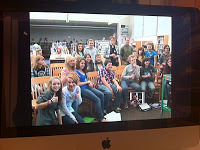 So, I just visited America, for an hour, to do a school visit, by Skype.
So, I just visited America, for an hour, to do a school visit, by Skype.The photo shows students from Gilbert H Hood Middle School, in Derry, New Hampshire.
This is the first time I've done an event by Skype - it was the idea of librarian Kathy Lane, and it was enormous fun. As I sat in my writing shed as dusk fell in England, I spoke to the students in Derry, about writing in general and about Revolver in particular.
The picture was great throughout, and with the aid of a roving mic I was able to hear the students' questions. Though I would normally use powerpoint to do an event, I was able to wave various things at the students that related to their questions - my notebook, the shell case that inspired Revolver in the first place, and so on. It was a very different, exciting kind of event, and I got to speak to students I would normally never be able to.
A taste of the future, and a very enjoyable one at that. Thanks to Kathy Lane, Mr Keeley, and all the students of the PACE group at Gilbert H Hood Middle School. Great fun to talk to you.
The only sad thing, maybe, was that I couldn't sign a book for anyone :-(
(Though there's even a machine that can do that now - they have one Waterstones Bookshop, Picadilly, London...)
Published on November 17, 2010 17:09
October 27, 2010
The Cave - Mervyn Peake
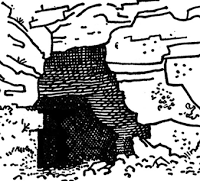 Last night I went to see a performance of The Cave by Mervyn Peake, in its world premiere run at the Blue Elephant Theatre.
Last night I went to see a performance of The Cave by Mervyn Peake, in its world premiere run at the Blue Elephant Theatre.In attendance, and in conversation afterwards with Neil Norman, was Peake's eldest child, Sebastian, who explained how after the death of their mother, he came into the possession of a suitcase of his father's effects. Understandably sorrowful after losing his mother, he didn't feel like rummaging around in the case. It was therefore over ten years later that he properly investigated its contents, and discovered bundles of unpublished writing by his father, including ten plays.
The Cave is the first of these plays to receive a production, selected as much as anything we were told, because it would suit the forces of the Blue Elephant Theatre. It's a short but powerful piece about a family across thousands of years, and deals with many things - conformity, rebellion, belief, love, I could go on here. I won't.
I really enjoyed it, the end in particular was genuinely chilling, and it's exciting to think there is more 'new' Peake material coming, for all the plays will be published by Methuen over the next three years. What was as fascinating for me, however, was the discussion afterwards.
Peake has always remained something of an acquired taste, on the fringes, a cult writer perhaps, maybe a writer's writer. I've got my own ideas why this may be, but last night I got the chance to ask Sebastian if he had an explanation for why his father, unlike his contemporary Tolkein say, never achieved the fame, success and to be blunt, money, that his work deserved. Sebastian's answer was the one his father's publisher once gave to the same question; he was too good.
He finished with a lovely quote I would like to reproduce here: It was once said that the difference between Tolkein and Peake is this: Tolkein stood on the top of the mountain, and he directed his forces from there. Peake was down in the valley, alongside his troops.
If you think of the difference between the Lord of the Rings and Gormenghast, I think that's true, and that unsettling, uncomfortable feeling you sometimes get when reading Peake is maybe another explanation for why he never fully entered the mainstream.
Published on October 27, 2010 01:53
October 14, 2010
The Raven Mysteries - Book V - Magic and Mayhem
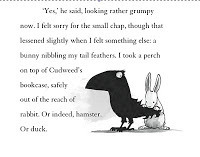 Book five of the Raven Mysteries series is not published until next Spring, but I've just received a full set of layouts with illustrations now in place, and I thought it would be nice to give a shout out to the wonderful man who makes the pictures for the words - Pete Williamson. Have a look at his wonderful website.
Book five of the Raven Mysteries series is not published until next Spring, but I've just received a full set of layouts with illustrations now in place, and I thought it would be nice to give a shout out to the wonderful man who makes the pictures for the words - Pete Williamson. Have a look at his wonderful website.I'm not going to give too much away at this stage, but since I don't often mention the Raven Mysteries here, I just want to say that I think this is going to be the best one yet, largely due to the depiction of hundreds of little white bunnies and thousands of large green cabbages. And also the depiction of the deadly, yes, deadly, combination of the two.
Witness poor Edgar here, just imagining what it would be like to have his tail feathers accosted by just one small, but determined bunny.
In the words of Solstice; "I love bunnies. They're so uncool, they're cool."
Published on October 14, 2010 03:02
September 24, 2010
Super Fanboy Geek Attack
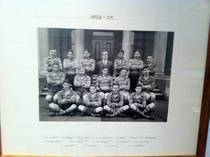
Yesterday I had the enormously wonderful privilege of speaking at Eltham College. This was not only because it is a very nice school to visit, but also because it happens to be where Mervyn Peake went to school.
That's him, second from the left in the back row of the 1928/1929 Rugby team. I was told he didn't make much of a player, well not compared to Eric Liddell who had recently passed through the school too, but that even then he was drawing drawing drawing all the time, even all over his English books.
I don't tend to lean towards hero worshipping generally, but yesterday I ignored that fact, and became the teenager I once was, obsessed by his writing: it reminded me how wonderfully strange Gormenghast was the first time I read it, and it reminded me why to be strange and unusual is a good thing in writing, much more fascinating than the mundane and the commonplace. Well, for my money anyway.
Thanks to my Dad for introducing me to Peake in the first place, and thanks to Stephanie Fearn of Eltham College for the invitation to visit the home of, yes, a hero.
Published on September 24, 2010 07:33
Marcus Sedgwick's Blog
- Marcus Sedgwick's profile
- 1579 followers
Marcus Sedgwick isn't a Goodreads Author
(yet),
but they
do have a blog,
so here are some recent posts imported from
their feed.



